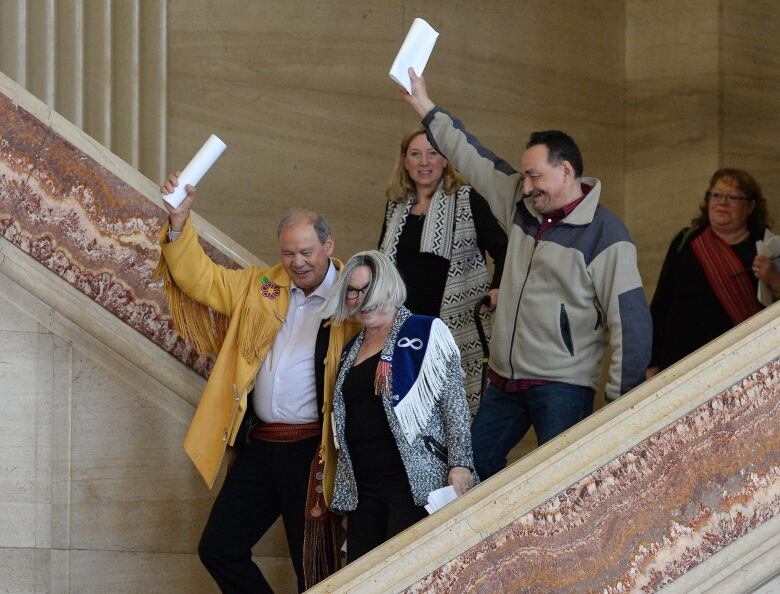Unanimous ruling says Ottawa has jurisdiction over all indigenous people
'This is a great day for over 600,000 Mtis and non-status Indians,' says Dwight Dorey
Canada's top courthas ruled that tens of thousands of Mtis and non-status Indians are now under the jurisdiction of the federal government, in a decision that the prime minister says will have "broad consequences and impacts."
"This is a great day for over 600,000 Mtis and non-status Indians," said Dwight Dorey, national chief of the Congress of Aboriginal Peoples, after the Supreme Court of Canada decisionwas releasedThursday, ending a 17-year battle.
"Now hopefully we will not have to wait any longer to sit at the table."
- ANALYSIS:What a landmark ruling meansfor Mtis, non-status Indians
- SCC decision will have long-term implications: Mtis journalist John Lagimodiere
- Ottawa Mtis ecstatic following Supreme Court ruling
In theunanimous ruling, which may serve now as a starting point for those pursuing land claims and additional government services, the court held that non-status Indians and Mtis are considered "Indians" under Section 91(24) of the 1867 Constitutional Act.
"This is a landmark ruling that will have broad consequences and impacts," said Prime Minister JustinTrudeau, adding that the government will need to studywhat those impacts might be.
"But I can guarantee you one thing:The path forward will be together as we move forward."

"I'm very happy that we were successful in removing a blockage," said Joseph E. Magnet, lead lawyer for the Congress of Aboriginal Peoples.
"The court recognized that this blockage has caused significant disadvantage, discrimination, and resulted in denial of programs and services that all governments recognized were necessary."
"This is a dream come true," said Gail Gallupe, president of McMurray Mtis Local 1935. The group represents Mtis people in Fort McMurray and northeastern Alberta.
'1,2,3 punch'
Jason Madden is a Mtis lawyer with Pape Salter Telleit, a firm specializing in Mtis and First Nations law. He calls Thursday's decision a "1,2,3 punch"that affirms the government hasjurisdiction over, a fiduciary responsibility to and the duty to negotiatewith Mtis and non-status peoples.
"It's about certainty and accountability," he said. "Without the certainty, government gets to play games and duck and deny.
"We believe that now we can move forward;now there is no jurisdictional barrier," said Clment Chartier, president of the Mtis National Council.
`[Government] cannot say, 'Well we can't deal with you because Section 91 (24) doesn't include you.' This of course strengthens our position."
Definition of 'Indian'
The word Indian has two meanings, the ruling explains:
- A broad interpretation that includes all aboriginal people.
- A narrow meaning to distinguish First Nations from other groups.
For the purpose of defining federal jurisdiction, the broad meaning applies.
However, the ruling also does not distinguish which communities are Mtis and which are non-status Indians. Determining whether particular individuals are non-status Indians or Mtis or exactly who this ruling now applies to is a "fact-driven question to be decided on a case-by-case basis in the future."
"There is no consensus on who is considered Mtis or a non-status Indian, nor need there be. Cultural and ethnic labels do not lend themselves to neat boundaries," the ruling said.
"Which is good," Madden`said. "Those issues are best left for the communities themselves to answer."
'Overwhelmed and ecstatic'

"He'd probably do a jig right now."
The case, known as Daniels vs. Canada, went to trial in 2011 and final arguments were heard in 2015.
Canada's top court was asked to rule on whether the federal government has the same responsibility to Mtis and non-status Indians as to status Indians and Inuit.
Leaders were screaming
Duane Morrisseau-Beck was one of about 100 people in the foyer of the Supreme Court when the decision was released.
"You should have seen the energy in this room go from zero to a hundred," said the Mtis man who lives in Ottawa, although most of his family are still in Manitoba. "The Mtis leadership came walking down the hall, screaming, you could hear it."
Morrisseau-Beck said his mother was overcome with emotion after learning of the decision.
"I guess it's just relief and happiness," he said. "She wants to know who the judges are so she can thank them."
Morrisseau-Beck said he still doesn't know exactly what the decision means, buthopes it leads to land claims for Mtis communities and increased services.
He also calls it a validation of Mtis rights and history.
With files from Janyce McGregor













_(720p).jpg)


 OFFICIAL HD MUSIC VIDEO.jpg)
.jpg)



























































































